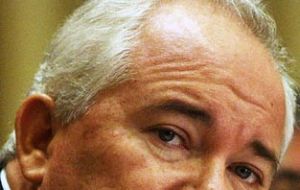MercoPress. South Atlantic News Agency
Saudi’s 70/80 US dollars a barrel stance prevails at OPEC meeting in Ecuador
 Venezuelan minister Rafael Ramirez says the adequate price is 100 USD a barrel
Venezuelan minister Rafael Ramirez says the adequate price is 100 USD a barrel Leading OPEC producer Saudi Arabia said it still favoured a 70-80 US dollars price range for oil, a restatement of a two-year-old policy that will be welcomed by consumer nations worried that rising oil prices may get out of control and hamper global economic recovery.
Saudi Oil Minister Ali al-Naimi told reporters at an OPEC meeting in Quito: “70-80 dollars is a good price.”
The comments came as the Organization of the Petroleum Exporting Countries agreed, as expected, to keep production restraints unchanged, despite a recent surge in crude prices to 90 dollars a barrel.
With OPEC's next meeting not scheduled until June 2, markets are likely to test Saudi Arabia's resolve to keep prices below 80 dollars. US crude closed at 87.79 a barrel on Friday having touched a two-year high of 90.76 earlier in the week.
Saudi, OPEC's most influential producer, is likely to face opposition to any change in policy from other members who argue that demand is not strong enough to warrant more oil and that speculators are to blame for driving prices up.
Price hawk Venezuela called for a 100 US dollars oil and said OPEC should not lift output again through the end of 2011.
“We believe that the market should compensate high production costs. A hundred US dollars appears to be an adequate price,” said Venezuelan Oil Minister Rafael Ramírez.
Iranian Oil minister Massoud Mirkazemi said global oil demand was “not good” and that “nominal prices are good, real prices are not.”
Riyadh may decide the best way to stop prices rising further is to quietly lift supplies to buyers through its monthly sales process rather than via OPEC policy.
OPEC agreed its biggest ever supply curbs at the end of 2008 after a price collapse from 147 to just over 33 dollars caused by a recessionary drop in fuel demand. It has not changed policy since.
Many OPEC ministers say supplies are sufficient and that they will only open the taps to meet extra demand.




Top Comments
Disclaimer & comment rulesCommenting for this story is now closed.
If you have a Facebook account, become a fan and comment on our Facebook Page!